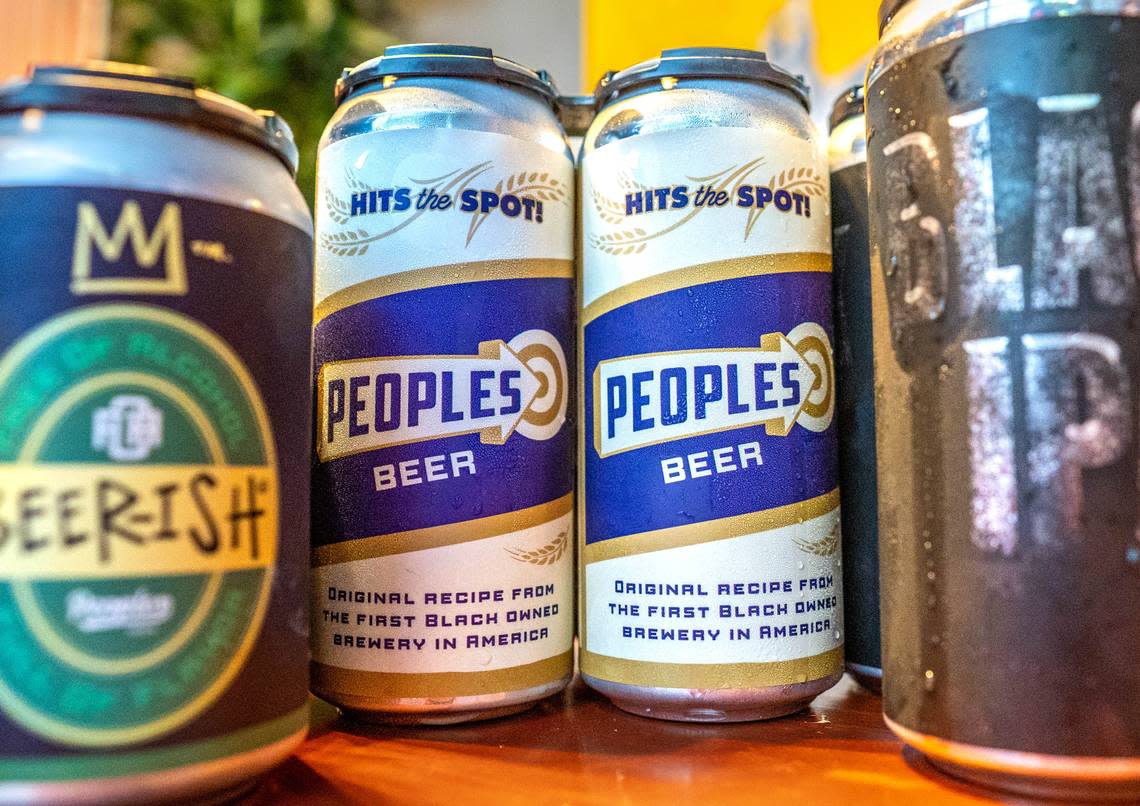Peoples Beer Fest in Sacramento’s Oak Park spotlights Black craft brewers
A new generation of beer makers continues to challenge the perception of who brews craft beer.
They’re doing it at showcases like Peoples Beer Festival in Sacramento’s Oak Park neighborhood on Saturday, and through a new national organization of Black beer makers founded by former Sacramento mayor, NBA star and Oak Park Brewing owner Kevin Johnson.
Their efforts are to help brewers of color gain a foothold in the multi-billion dollar U.S. craft brewing industry where fewer than 1% of the commercial craft brewers who fuel the sector are Black.
“With Peoples Beer Fest, we hope to help recognize people of color in craft beer — past, present and future — and create a platform for minority-owned breweries and homebrewers to grow their businesses,” said Rodg Little, co-owner of Oak Park Brewing Co., the anchor of the annual Sacramento festival.
More than 30 breweries from across California will open their taps 2-7 p.m. Saturday on 3rd Avenue in Oak Park. They’ll be joined by live performances by Bay Area hip-hop pioneers Digital Underground.
The festival comes off the heels of National Black Brewers Day, marked Tuesday, which shines a light on Black artisans and the brews they’ve crafted. One of them, Theodore Mack, became the nation’s first Black brewery owner Oct. 10, 1970, when he purchased Peoples Beer in Oshkosh, Wisconsin.

With the blessing of Mack’s surviving family, Oak Park Brewing revived Peoples Beer’s signature lager in 2020, a half-century after it last was sold on store shelves, restoring a lost chapter of Black American brewing history.
“The beer hadn’t been brewed in 50 years; the recipe is close to 100 years old,” Little said of the lager, a simple mix of six-row barley, flaked corn, clean yeast and Munich malt. “We want to share his legacy. We want his legacy to live long and strong, even though he’s gone.”
What began three years ago as a celebration of Mack’s legacy with a slate of eight Black-owned breweries is now billed as California’s largest showcase of its kind.
But Black beer makers remain a sliver of the $28 billion U.S craft brewing market, according to the National Black Brewers Association, the newly-formed trade group dedicated to changing that statistic.
The goal of the association, known as NB2A, is to “create a more inclusive and vibrant beer industry by providing Black brewers access to the resources, mentorships and networks needed to thrive,” Johnson said at the trade group’s Nashville launch at the yearly Craft Brewers Conference in May. The association advocates for and helps shape policy to boost the numbers of Black brewers in the industry.
“We’re doing the work. Now there’s a platform to help all these people who need help,” Little said. “Even though we’re Black-forward, we are inclusive. We want to have resources. We want to talk about ownership whether it’s minority- or Black-owned because we represent less than 1% of the industry.”
Black filmmaker presents documentary on Black craft brewers
Saturday’s festival is preceded by the Oak Park Black Film Festival, 6 p.m. Friday at the Guild Theater, 2828 35th St., and showings of beer label art and beer and food pairings.
Filmmaker Aaron Hosé’s 2021 documentary “One Pint at a Time,” caught Johnson’s eye with the work which chronicled the journeys of Black craft brewers and their struggles to gain footing in a largely white industry. Hosé would later join the NB2A as a board director and is in Sacramento this week for the festival.
“We always ask viewers, if any of you in this room would close your eyes for a second and try to imagine who made that beer, it’s not a woman, it’s not a person of color,” Hosé said. “That’s the perception and I thought it was time to change that.”
Hosé’s film featured Black brewers in New Haven, Connecticut; New Orleans; and Tampa, Fla. Their struggles were the same — the hustling to market their product and get it on store shelves; the struggle to build out their breweries. The resistance they faced to Black beer investment in their communities.
The issues, Hosé found, mirrored Black entrepreneurs’ traditional roadblocks to business creation, investment and wealth.
“One of the most surprising things about making the documentary was realizing how similar the stories are and the struggle that Black brewers face: Access to capital. Finding a location,” Hosé said. “There are decades of issues like redlining or a lack of generational wealth. And it’s the same for Hispanic or Latino brewers or Native American brewers or white women brewers.”
Johnson sat with Hosé last year and shared the idea of bringing together the most influential Black brewers in the country: Marcus Baskerville of San Antonio’s Weathered Souls Brewery; Celeste Beatty of Harlem Brewing Company, in New York; Teo Hunter of Inglewood’s Crowns & Hops, and others.
“He said it lit a fire under him. He realized how many people didn’t have their own brick-and-mortar location just yet. They were pouring at festivals or other events,” Hosé said of Johnson from his offices in Orlando, Fla.
Little, a rock musician-turned-brewer, was one of them. He was a member of the multi-racial Sacramento home brewing collective Underground Brew Squad before Johnson called him in late 2018.
“We’re here to tell the story, control our narratives and definitely work on Black ownership so we have more equity in the market. To be mentors and coaches and open doors up for people who want to get into the industry and start their own breweries,” Little said. “We’re here to be the beacon.”






